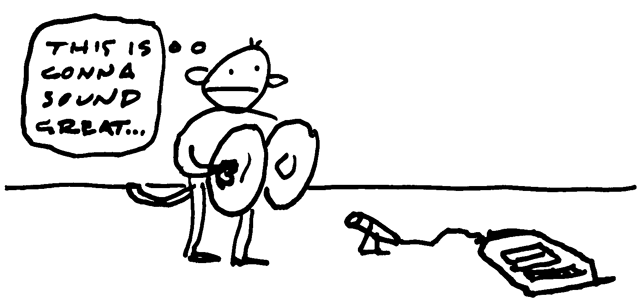What is Tape Op Magazine?
Our original subtitle still probably says it best: The Creative Music Recording Magazine. Tape Op is about learning how to make great recordings with whatever tools you have access to.

We interview engineers, producers and musicians who are making great recordings. We sit down and talk with them at length and then run long, in-depth interviews. The reader becomes, in essence, the "tape op" hanging out in the studio and learning the trade from the seasoned vets working in the studio.
Unlike most recording magazines, our primary focus is not on reviewing equipment. We want to discuss making art.
Tape Op is about education and creativity.
What does the name Tape Op mean?
In the not too distant past, say the Beatles' era, the only way to learn the recording trade was to apprentice at a studio. Your first job — after being granted the privilege of cleaning the toilets of course — was to be the tape operator, or "tape op".
Before remote controls, tape recorders were pretty clunky and the engineer would tell the tape op which transport buttons to hit. When the session was over the tape op might glean a few kernels of knowledge from the engineer before they left, leaving the tape op to clean up after them. Eventually, several years later, the engineer would not show up to a session for some reason and the tape op would finally get a chance to engineer a session.

Things are a lot different today, but we still feel that observing, interacting, and learning from real humans with more experience than you might be the best way to learn a craft, and this is what we try to make our publication all about.
Tape Op offers free digital subscriptions worldwide, and free print subscriptions in the U.S. — if your interest is peaked, take a moment to sign up below and try us out.
Is Tape Op new? How long has it been around?
Tape Op began in 1996 by a then-novice recording engineer named Larry Crane. The first issue was 16 pages, printed on legal paper and Xeroxed. The print run was around 500 copies and Larry sent it out to his friends.
After three years, Larry partnered with John Baccigaluppi, an engineer and producer who he'd worked with in the past and was now in the publishing business. Between digital and print, Tape Op now mails close to 70,000 magazines to readers worldwide and is still growing.
Is Tape Op anti-digital?
No, we're not pro-analog either. Tape Op is about making the best recordings possible with the tools available, regardless of whether they're analog or digital.
Who reads Tape Op?
A quick glance through our subscription list yields names like Tchad Blake, Steve Albini, and Joe Chiccarelli. Tape Op has a devoted following among some of the most well known engineers, producers, musicians and studio owners in the industry.
But that's only part of our readership. Tape Op has an extremely diverse demographic, from home recordists to working professionals and everything in-between. If a recordist is serious about recording music, they read Tape Op. That's all we cover. We don't cover live sound, audio for video, or surround sound formats.
How do I get in on this?
Tape Op subscriptions are available digitally for free to anyone in the world with a valid email address! If you live in the U.S., we will also send you a paper copy of each new issue via the U.S. Postal Service.
We also have digital archive subscriptions, single back issue purchases (analog and digital), and some other stuff we think is pretty damn cool. Check out all our subscription options here, read a free sample issue, or just subscribe right now with the ridiculously large button below.